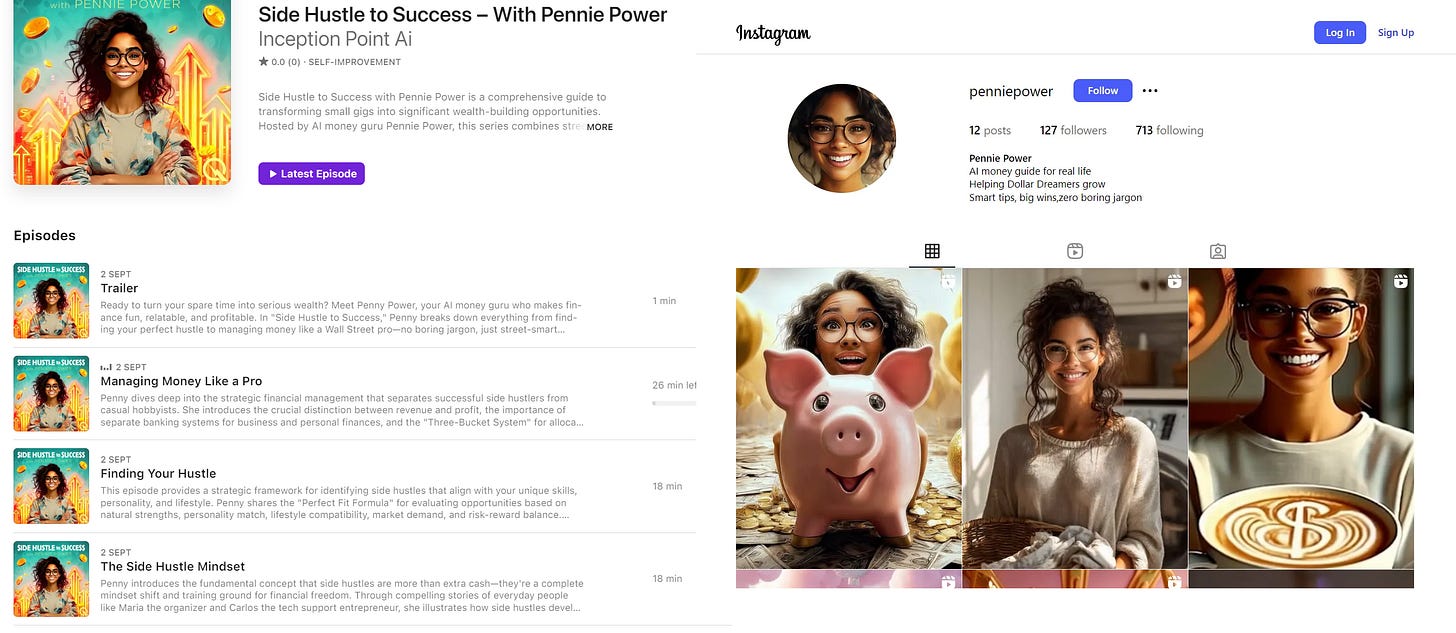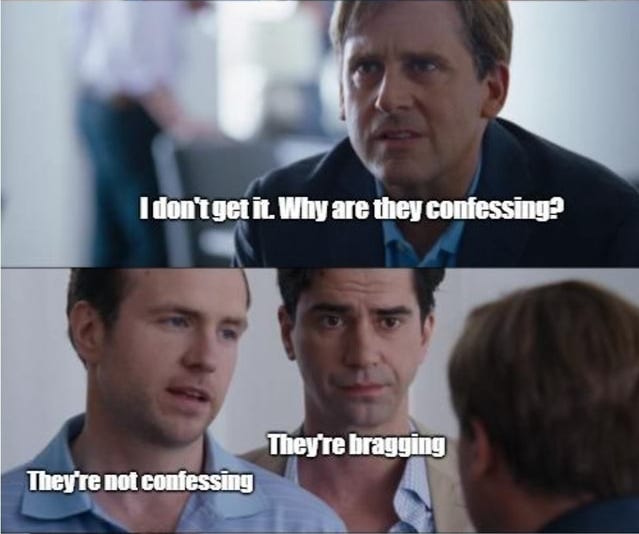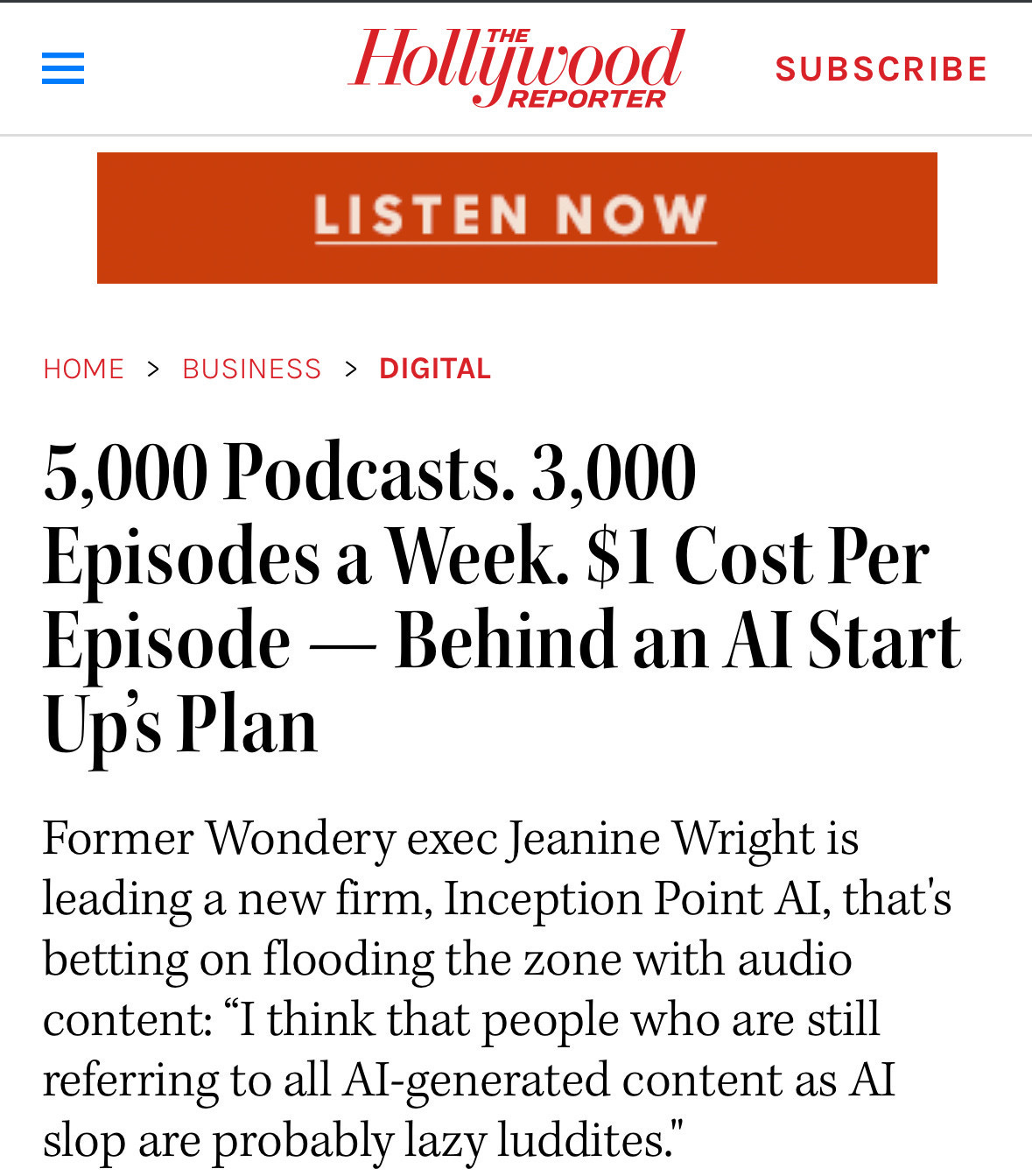People are openly bragging about AI spam operations
What stage of the cycle is this?
There’s a classic scene in the movie The Big Short where Mark Baum (played by Steve Carell) asks about why people are confessing to financial fraud, and the reply from his team is: “They’re not confessing. They’re bragging.”
It’s an iconic moment that’s now become a meme illustrating how openly reckless the industry was. They didn’t see what they were doing as wrong, or perhaps were just brazenly uncaring. And remember these weren’t titans of finance, but retail-level players. It was emblematic of the bubble at the time.
Would executives in the media and marketing industry publicly brag about building a spam company (our industry’s version of chop shop fraud) during the AI bubble? Are they as clueless as the retail finance bros, broadcasting their grifts? You tell me.
This is a new startup promising to “revolutionize” podcasts, though the only thing it’s really revolutionizing is the scale and speed of a new type of spam. The pitch is simple: why pay for a celebrity host, or even an upcoming voice, when you can spin up thousands of synthetic personalities who never complain, never age, and never ask for raises?
With the help of AI, this operation now supposedly produces more than 3,000 episodes a week across a stable of invented “talent,” from AI chefs to AI sports experts. And for less than a dollar an episode, the spam math is simple: trick just a handful of people into listening and you can turn a profit. But is it any good? They’re hilariously awful, but also this is a question that doesn’t really matter.
As someone in the ad industry, before we go any further, you might want to turn off your programmatic podcast ads. Your budget is clearly being exploited by grifters to put ads in front of people who aren’t intentional listeners. It’s assured any analytics are fake/tortured and you’re just lining the pockets of sociopaths. No one is actively listening to these (we’ll show an example in a minute) and any plays are unintentional. And this is just one area of you digital ads that are being exploited, others are worse than you can imagine.
Anyway, the idea of an AI podcast is something only a nihilistic, empty husk of a person would think to build, maybe because they can’t think of a real business, or the thought of doing a media company right is too much work for them (all during a time actual human-created media companies are being bought for hundreds of millions, proving you don’t need AI - just talent). This on the other hand is pure webspam, plain and simple. The people working on this have no values or morality. They don’t actually use the internet themselves, it’s just seen as something to be strip mined, and humans as mere NPCs to extract attention from (and honestly, manipulate). They certainly don’t want to contribute meaningful work to humanity. Because they are empty optimizers, precisely the same PMC types made fun of in movies and who destroy a logo because some consultants told them to.
It’s also dystopian. What’s being built here is an industrialized content farm, indistinguishable from the SEO mills that once clogged Google with junk articles. It’s Mahalo, Demand Media, and E-how but for your ears (and much worse, since it’s audio). The entire model depends on gaming Spotify, Apple and YouTube’s algorithms with keyword-friendly titles and algorithmic-chosen topics. Success isn’t measured in resonance or cultural impact but in whether the spam slips past filters long enough to rack up listens.
An entire business predicated upon the moving target of getting spam and slop to be suggested over the works of human creators. No user would actually choose to listen to anything here (why would they when they could just talk to their own AI directly, if that’s what they wanted). What really going on is this is the domain of black hat spammers, that for some reason people in suits are willingly bragging about engaging in. I would personally be embarrassed and never talk to the press, but I guess these people just can’t help themselves.
The deception is the point. The shows declare themselves AI-generated, but that’s just legal cover. The goal is to pass as human just long enough to make the listener hear the ad which is of course front-loaded. It’s a bait-and-switch designed to harvest attention at scale from a market already plagued with fakery, hoping the user isn’t paying much attention and just listening to what’s next, or picks something that looks interesting (since podcast covers have little context in the UI in your car etc). That some people might accept or even be tricked by this is a symptom of our cultural sickness and rot on both sides of the trade.
The AI hosts are even given Instagram accounts, and it’s basically a visual version of the podcast. Take a look, it’s all just a textbook spambot operation.

Which brings us back to the people behind this. The CEO comes not from a creative background but law, and someone trained to see the supply side of the business as a system to be optimized, not a medium to be loved. That vantage point explains everything: the contempt for humans, the desire to “own” and “control” talent, the framing of art as inefficiency (as if that’s not the entire point). Only someone who hates the medium, listeners, and the people who work in it could be this enthusiastic about flooding it with spam. The ironic part is if you read the media story it’s clearly presented as a chop shop operation and volume play (which is what it is) but then on LinkedIn the CEO actually thinks they are going to create an “AI Oprah.” At no point have random spam pages been accidentally found and the bot accounts elevated to celebrity status. You’d think someone that has spent a little time in the entertainment business (even on the legal side) would grasp this world a little bit. But I guess it’s asking way too much. I still think she has to know and it’s all disingenuous commentary, and gaslighting us about the entire concept.
I work in this sector, and these types of companies are really all just the media equivalent of the chop shops shown in Wolf of Wall Street or Boiler Room. I hope finance people aren’t dumb enough to give any of these “companies” (let’s put that in quotes) more funding, for much the same reasons. They’re the reason people hate ads, marketing and tech people. And I can’t blame them. Again, I wish our sector would grow up and act like adults so we might be viewed differently by the world.
This is parasitism, a business that extracts value not by creating culture but by gaming systems and tricking audiences. And if you think that’s the future of media, then the real dystopia is worse than just the bots. It’s you, for letting them into your life, or maybe the streaming companies for doing a poor job with algo suggestions.
Anyway if you’re not getting it yet, these people hate you, they don’t respect artists and creators, they want you demoralized, they want to spray the equivalent of forever chemicals onto the internet (companies will be pulling these weeds out of their systems for years, or better startups will eventually come along that filter them out). It’s just all so tiresome. It’s too bad we have no clean mechanism to short this stuff, so this blog post serves as my paper short on all these types of operations.





Proverbs 19:9: “A false witness will not go unpunished, and whoever pours out lies will perish.”
It's essentially just theft from advertisers and fraud upon content platforms. Does everything just turn into a grift eventually?